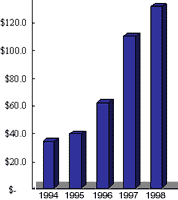Economics - The Road to Hell - Winfield Patterson |
|
Any discussion about class in America is immediately suspect. This is, after all, a nation whose stated mission was to create a meritocracy, where wealth would be accrued by the individual in accordance with his worth to The Market, free of the tyranny of government or social institutions. Of course, the men who made that statement owned slaves, and were willing to grant the vote only to other land-owning men. Sitting here, in Silicon Valley, working as a corporate securities paralegal in the biggest, baddest law firm west of Washington D.C., I see regular people living the American Dream every day. My job is to deal with options and stock in the oh-so-hot tech sector of the economy - and I'm here to tell you, regular people are getting stinking rich. I know receptionists that stand to make upward of ten million dollars when their company goes public, and that's not even counting the millions more software and hardware engineers are going to make. But the real question here is how? And why them? And more importantly, why not you? There is an undercurrent of jealousy that accompanies every Horatio Alger story, an aftertaste of resentment when we find out that someone doing an easier job, with less education and fewer years in the workforce has just retired at age 28. Our better angels may scold us for the thought, but there it is: How? Why? Why not me? The answers are many. First, they got in on the ground floor of a company that might have gone under, rather than having gone public. Second, having overcome their fear of unemployment, they successfully negotiated stock options into their contracts. Third, those options were cheap enough that they could afford to exercise them all, and fourth, they stuck around until the company went public. Stock options for lower-level employees are common in the tech sector - nobody in Silicon Valley takes a job anywhere without a piece of the big pie. Unfortunately, the bastions of Wall Street have not followed suit. GM, Ford, and virtually every other major company outside of the tech sector do not offer their employees cheap stock options, reserving them instead for top executives. Thank the unions for this oversight. Options have been around for decades, but the unions fought for higher wages rather than option plans - and they priced many manufacturing jobs right out of the country, leaving workers who were accustomed to making $18 and $20 and hour on an assembly line to find service industry jobs that paid barely minimum wage, with no health benefits. But options are only one way to get rich. Start-up companies are thick-on-the-ground here, and they're desperate for capital. Every third person on the street will whip out his business plan inside of five minutes, hoping you work for a venture capital firm. It's a little like Hollywood, except instead of screenplays, waiters slip business models and market forecasts under your plate.
So let's say the impossible happens: Somebody you've never met convinces you they have The Next Big Thing, and all they need is a little start-up capital, just enough to get the ball rolling. Maybe enough to put together a workable presentation and secure an attorney and hire a programmer and rent a cubicle someplace. And let's say you happen to have forty grand lying around, just enough to start. Even if the guy cuts you in for ten percent and gives you the stock certificate, the deal is illegal. Why? In order to take advantage of this gem, you've got to be an "accredited investor". An accredited investor is defined as 1. Someone who makes more than $200,000 a year, and 2. Has a total net worth of at least $1,000,000.00. Dejected to learn that your forty grand is the only money you have, and that your job as a programmer doesn't qualify you anyway, your gem moves on until he finds someone rich - who will then get richer. Passed in the 1930's to protect orphans and widows from being sold junk stock, this law has a double edge - it protects the poor, but keeps them poor. And locks you out as well, codifies the class structure, and guarantees that the richest people in the world remain... the richest people in the world. Thank Roosevelt. He's protected you from yourself. After all, The Next Big Thing might have tanked, and you might have been out forty grand. Then again... it might not have. If you had met Jerry Yang (Yahoo co-founder)in 1995, when it was just he and one other guy in a trailer at Stanford, and he had offered you 3% of his company then for enough cash to upgrade the servers, you would be a billionaire now. That's Billionaire. With a "B". By putting themselves in the position of "protecting" the poor, and "fighting for their interests", Democrats have helped to codify the class structure, and keep the impoverished impoverished, the rich rich, and the middle class supporting the whole foolish system with the bulk of the income tax burden. When we Republicans talk about "deregulation" in the securities industry, this is what we mean. |

